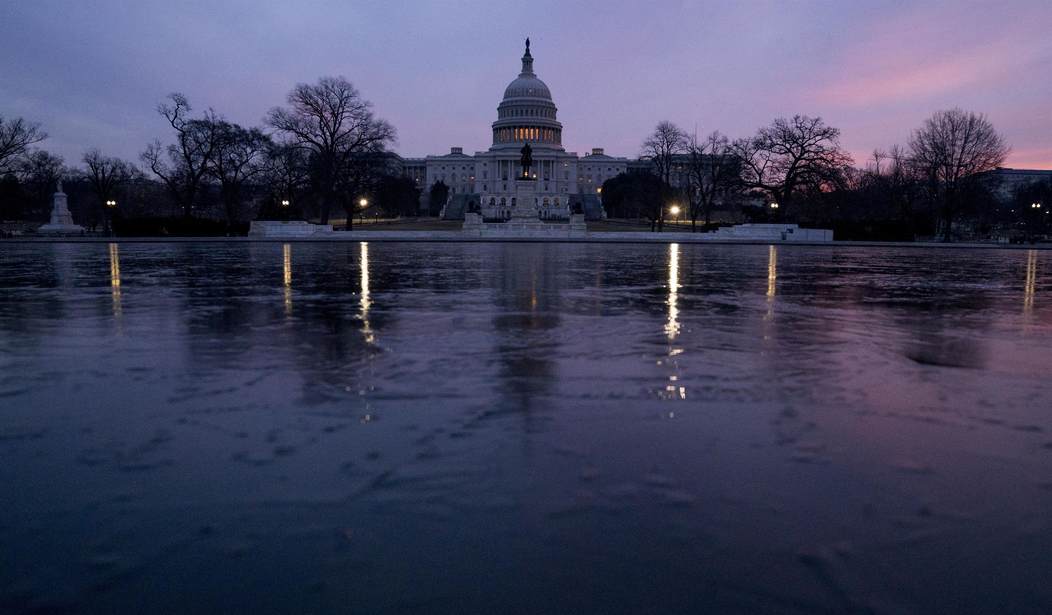The primary job of Congress is to pass a budget. Yet year after year, its members fail to do their job. This year is no different. The week before Christmas, and in the midst of a budget deficit that's exploding along with the national debt, the Senate rushed to prepare a stopgap spending bill to keep the government open for a couple months. In other words, we're left with unnecessary uncertainty and a growing pool of red ink.
The Senate measure has an expiration date of Feb. 8, so its main intent was to temporarily prevent a government shutdown -- the third such shutdown threatened during Donald Trump's presidency. It's worth noting that no matter what you read in the media and what talking points you hear from the Washington establishment, there's a lot of exaggeration about what a government shutdown really means, since 75 percent of the budget is already funded. That includes all of the mandatory programs (e.g. Social Security, Medicare, Medicaid and interest payments on the federal debt) plus six federal departments, including the Department of Defense.
Funding for the other departments lapses without a stopgap bill. For employees in these departments, it means either working without pay if they're deemed essential or being furloughed. Either way, it's not pleasant to contend with, especially as families try to celebrate the holidays.
In other words, even though shutdowns aren't the wide-scale calamity that many imply, it displays yet again the incredibly irresponsible members of Congress who seem to be chronically unable to perform their No. 1 job. And I when I say "chronically," I really mean it. While people like to talk about how "the budget process is broken" or "things are getting worse," the truth is that Congress has suffered for decades from this shameful inability to do its job.
According to a January 2018 report by the Pew Research Center, "in the four decades since the current system for budgeting and spending tax dollars has been in effect, Congress has managed to pass all its required appropriations measures on time only four times: in fiscal 1977 (the first full fiscal year under the current system), 1989, 1995 and 1997."
Recommended
Four times in 40 years! Imagine if you were to only do your main job 10 percent of the time. How long would it take for you to get fired? Not long, I bet. And yet this is what members of Congress have done since before the turn of this century. As you can imagine, this malfunctioning process isn't conducive to finding ways to cut down our soon-to-be $1 trillion deficit and $22 trillion debt.
And yet we keep reelecting the same members to Congress. Occasionally, we elect new members, but they soon follow in the steps of their older colleagues. It's crazy.
Furthermore, although it's very fashionable to talk about budget-process reform, no such reform will address the issue as well as people might think. That's because even the best possible budget-process reform won't change this sobering reality: Every year, the spending that's under Congress's full purview -- so-called discretionary spending -- becomes a smaller and smaller share of the budget. That's because the rest of Uncle Sam's spending grows automatically. Back in 1970, the share of discretionary spending was 62 percent of the whole budget. Today, it's down to 30 percent. Absent fundamental fiscal reform, by 2040 it'll be south of 20 percent.
This reality has two main consequences:
First, we're left with uncontrolled federal spending and deficits due to that automatic growth of entitlements under existing budgetary arrangements.
Second, when left with a smaller share of the overall budget to divide amongst themselves and their particular constituents, politicians from both sides are left wrestling for whichever of their priorities or pet projects they can fund. When you have hungry dogs fighting over smaller and smaller bowls of food, you shouldn't be surprised that they fight for every bite more viciously.
The failure of our "leaders" to lead in addressing this issue is why our budget process has spiraled ever more wildly out of control. It's why the government is always on the verge of shutting down. And it's why the national debt continues to explode.
Unless and until we address the mandatory-spending framework that undercuts Congress's ability to manage the entire federal budget, no other process reforms will matter. Chaos will persist.

























Join the conversation as a VIP Member